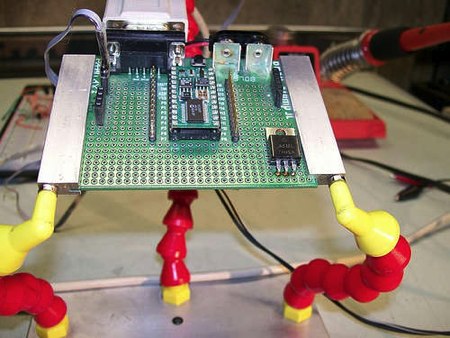
We like clever work bench accessories; especially the kind that make our projects that much easier. [rstraugh] put up his version of the ubiquitous helping hands: thirdhand++. The arms are made from modular coolant tubing that’s made for machine tools. With the basic arms in place, he created several attachments – like this PCB holder, a LCD holder, the usual alligator clips and even an oscilloscope probe holder.
Year: 2008
Electric Bandages
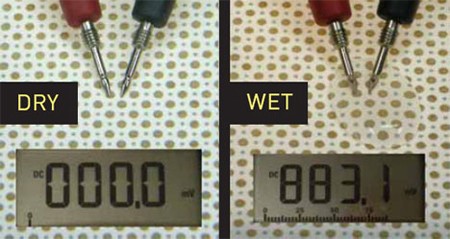
Silverleaf Medical products has created an electric wound dressing that staves off infection by killing microbes in an open wound and preventing other germs from getting in.
They call it the CMB Antimicrobial Wound Dressing, and it is made of polyester fabric woven with a proprietary material called Prosit. When the bandage is moistened, the Prosit generates a low voltage, killing germs in the wound. One of these bandages can be worn for 3 days at a time, and their clinical trials indicate that they are highly effective in treating infected wounds. Take a look at their brochure (PDF file) for some informative and stomach-turning before and after photos.
[via Medgadget]
Roast Marshmallows With High Voltage
The guys (and gals) over at the NYCResistor definitely know how to have a good time. They decided to roast some marshmallows with a Jacobs Ladder. Mmmm. There’s nothing like fresh 15,000 volt roasted.
Metasploit On The IPhone
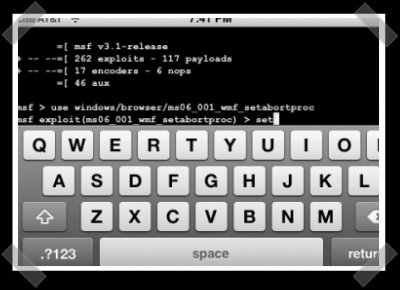
[muts] went through some trials, but managed to get metasploit running on his iPhone. Later he found out that it comes with the Cyida installer that he used on his journal to manually install it. Still, it’s interesting to see these tools showing up on the platform.
25th Chaos Communications Congress
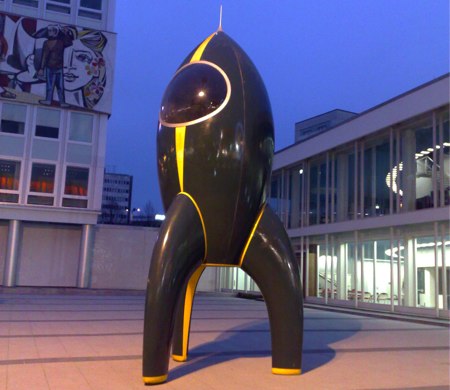
The 25th annual Chaos Communications Congress is happening December 27-30th in Berlin, Germany. They’ve just published their official call for papers. Last year’s 24C3 was incredible and we’ll take any chance we get to attend an event held by the fine folks in the CCC. We hope to see you there!
[via BoingBoing]
Flip Camera Microscope And Macro Lenses
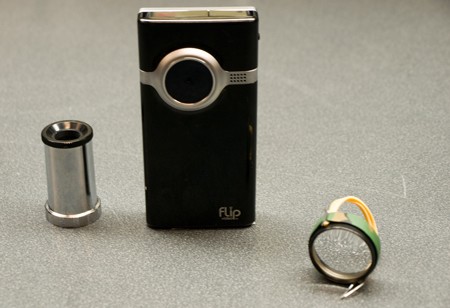
Flip cameras are fun and easy to use, but not particularly versatile. If you’ve had poor results at macrophotography with a Flip, you might be interested in these DIY lenses. One is macroscopic lens for taking photos and video of small things, and the other is a microscope for even smaller things.
To construct the macro lens, you’ll need a pair of binoculars, some rubber bands and paper clips. Simply remove the lenses from the front of the binoculars, complete with the plastic casings that hold them. Thread a rubber band folded in half to the plastic casing and hold it in place with small segments from the paper clip. Now place the lens in front of the Flip’s lens and secure the rubber band around the flip.
The microscope’s eyepiece uses no such attachment method, simply hold it in front of the Flip. The same process can’t be used here because getting the proper focus requires it to be held at varying distances from the camera, not flush against it like the macro lens. In any case, it’s any easy mod that should have you taking pictures of bugs and other tiny things in no time. Look after the break for video of the lenses in action.
SSD Hard Drives Tank Laptop Battery Life
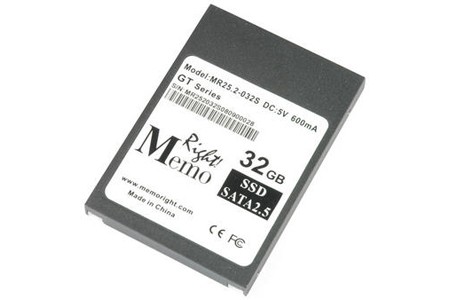
Tom’s Hardware has been running some tests to challenge the common assumption that SSD hard drives use power more efficiently than magnetic plate drives. Their results were quite definitive: not only are they not as energy efficient, SSDs actually use more power than conventional hard drives.
What they found is that most plate drives are at peak consumption (up to 4W) when accessing files fragmented across the media, which causes the actuator to move back and forth across the media several times. However, this is almost never sustained for extended periods of time; the actuator usually doesn’t move much when reading unfragmented data, and most plate drives are also capable of going idle when they are not in use.
Most SSDs on the other hand, only have two states: on and off. This means that when they are on, they are always at peak energy consumption. Though this number hovers around 2W for most of the SSDs they tested, over prolonged periods this can mean a great deal more power consumption than is immediately apparent, which can have short and long term effects on the battery life of a laptop. See the Tom’s Hardware article for benchmarks of specific products and more in-depth data.










